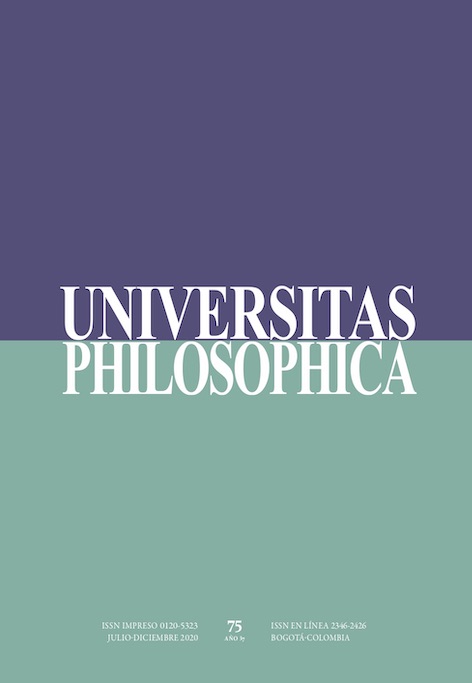Resumo
Quizá existan pocas obras de filosofía que integren de una manera tan certera aspectos dialécticos y retóricos como el Contra Academicos. Más aún, en ciertos momentos se hace difícil separar ambas técnicas discursivas, salvo por algunas pistas que San Agustín propone en el texto. Todo lo anterior, a pesar de la posición de tensión que manifiesta el autor entre, por una parte, su impulso de alejarse de la vanidad de la retórica aprendida en su juventud y, por otra, la conveniencia de su utilización para la persuasión del auditorio. Con todo, respecto de la retórica podemos afirmar que hay dos momentos en los cuales es posible reconocer claramente su presencia en la obra: 1) las referencias directas a la “persuasión” y a elementos técnicos propios de la oratoria; y 2) la puesta en práctica de un discurso retórico, en este caso necesario y no accidental, para coronar la argumentación. En este artículo analizo ambos aspectos de un modo sistemático, con el fin de indagar las razones por las que este diálogo agustiniano requiere, para lograr su objetivo, la comparecencia de dialéctica y retórica.
Agustín de Hipona (1971). Contra los académicos. (Trad. V. Capánaga). Madrid: BAC.
Agustín de Hipona (1979). Las confesiones. (Trad. A.C. Vega). Madrid: BAC.
Agustín de Hipona (1995). Las retractaciones. (Trad. T. Madrid). Madrid: BAC.
Agustín de Hipona (2006). La trinidad. (Trad. L. Arias). Madrid: BAC.
Anónimo (1997). Retórica a Herenio (Trad. S. Núñez). Madrid: Gredos.
Aubin, J. (2014). Augustin et la rhétorique à la fin du IVe siècle : quelques liens entre le De doctrina christiana et le De rhetorica. Revue d’études augustinnienes et patristiques, 60, 91-110. doi: 10.1484/J.REA.5.102914.
Catapano, G. (2006). Quale scetticismo viene criticato da Agostino nel Contra Academicos? Quaestio, 6, 1-13.
Covarrubias, A. (2007). Orator perfectus: la réplica de San Agustín al rétor ideal de Cicerón. Teología y Vida, XLVIII(2/3), 141-147.
Covarrubias, A. (2014). La superación de la tensión entre sabiduría, filosofía y retórica en Quintiliano y San Agustín. Pensamiento: Revista de Investigación e Información Filosófica, 70(262), 39-56.
Covarrubias, A. (2018). El poder transformador del discurso y de los ejemplos personales en Agustín: Ambrosio como modelo oratorio. Teología y Vida, LIX(4), 519-538. doi: 10.4067/S0049-34492018000400519.
Dolby, M. C. (2001). La influencia del diálogo Hortensio de Cicerón en San Agustín. Anuario Filosófico, 34, 555-564.
Fuhrer, T. (2006). Augustine on Rhetoric and Dialectic in Theory and Practice. Classica, 19(1), 99-114. doi: 10.24277/classica.v19i1.107.
Heil, J. (1972). Augustine’s Attack on Skepticism: The Contra Academicos. Harvard Theological Review, 65, 99-116. doi: 10.1017/S001781600000239X.
Horn, C. (2012). Agustín de Hipona: una introducción. (Trad. P. Domínguez). Santiago de Chile: IES.
Lanham, R. A. (1991). A Handlist of Rhetorical Terms. Berkeley/Los Angeles/London: University of California Press.
Lausberg, H. (1990). Manual de retórica literaria: Fundamentos de una ciencia de la literatura. (Trad. J. Pérez Riesco). Madrid: Gredos.
Murphy, J. J. (1967). Saint Augustine and Rabanus Maurus: The Genesis of Medieval Rhetoric. Western Speech, 31, 88-96.
Pernot, L. (2013). La retórica en Grecia y Roma. (Trad. K. Castañeda & O. Hernández). México: Universidad Nacional Autónoma de México.
Pujante, D. (2003). Manual de retórica. Madrid: Castalia.
Satterthwaite, P. & Porter, S. (Eds.). (1997). The Latin Church Fathers. Handbook of Classical Rhetoric in the Hellenistic Period (330 B.C.-A.D. 400). Leiden: Brill.
Stróżyński, M. (2009). Rhetoric in the Service of Contemplation in St. Augustine. En: Symbolae Philologorum Posnaniensium Graecae et Latinae, Vol. XIX, 289-296. Poznan: Adam Mickiewicz University Press.
Taylor, J. H. (1963). St. Augustine and the Hortensius of Cicero. Studies in Philology, 60(3), 487-498.
Topping, R. (2009). The Perils of Skepticism: The Moral and Educational Argument of Contra Academicos. International Philosophical Quarterly, 49(3), 333-350. doi: 10.5840/ipq200949346.
Vico, G. (2005). Elementos de retórica: El sistema de los estudios de nuestro tiempo y Principios de oratoria. (Trad. C. Rodríguez & F. Romo). Madrid: Trotta.

Este trabalho está licenciado sob uma licença Creative Commons Attribution 4.0 International License.
Copyright (c) 2020 Andrés Covarrubias Correa



